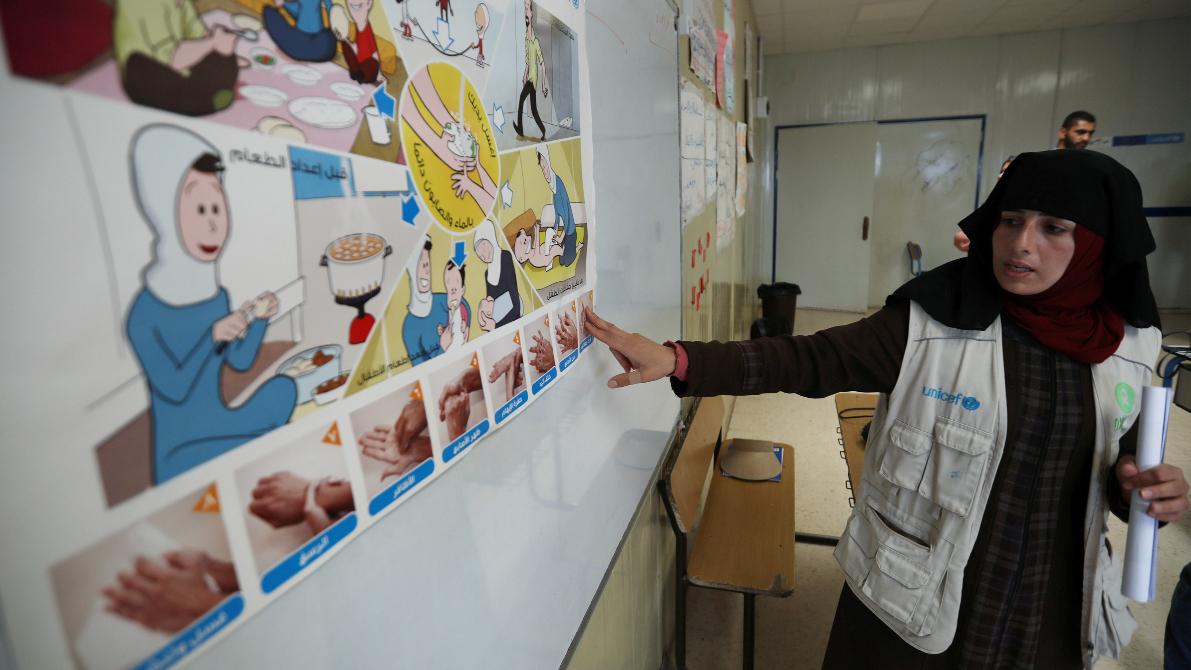Border closures, travel restrictions limit relief organizations
An instructor teaches Syrian students how to wash their hands as part of an awareness campaign about coronavirus initiated by OXFAM and UNICEF at Al Zaatari refugee camp in Jordan on March 11, 2020.
Humanitarian organizations around the world are geared toward helping pople. But now, these organizations are facing their own challenges amid the COVID-19 pandemic, like planning for possible supply chain shortages and having to quickly review staff travel and community engagement programs.
Several relief organizations have announced the elimination of non-critical missions to limit staff exposure to the virus.
Related: International researchers race to develop a COVID-19 vaccine
“This is forcing a concurrent set of events. Triage [is one] because we need to make sure [that our staff] is caring for their own families, while continuing to deliver our humanitarian and development programs and also working to scale up programs,” said Abby Maxman, president and CEO of Oxfam USA. “We’re doing everything at the same time, these are extraordinary circumstances where everybody is affected.”
The World’s host Marco Werman spoke with Maxman about the impact of these disruptions.
Marco Werman: What can you still do and what has coronavirus forced you to stop doing?
Abby Maxman: We’re scaling up our hand-washing and water sanitation hygiene work, helping communities get access to the information they need about the virus and how to stay healthy. But we also know that in places like refugee camps where social distancing is so difficult, some of the infrastructure needs are just not possible. Our concern is ensuring our partners and local communities who are working with us have access to the basics they need to continue their work.
Related: ICE gets sued to release immigrant detainees amid COVID-19 pandemic
Abby, as you look at the map of the world right now, what populations are you most worried about as COVID-19 continues to spread?
Oxfam is working right now with our partners in 65 countries to coordinate our response to COVID-19. It’s important to note that the humanitarian system was already overstretched and underfunded before this crisis. So, we know [that] marginalized communities, refugees, migrants are disproportionately affected. We know that women, as well as frontline health workers, are disproportionately affected, so we’re deeply concerned about the impact on poorer countries that have weaker health systems and places where people are already facing multiple threats to their health and livelihood. This is going to require a global, coordinated response as a matter of priority.
Oxfam, like the rest of the global economy, relies on supply chains for your humanitarian work. We can’t get hand sanitizer and toilet paper in the United States. How are you doing it?
We’re working with the international community, WHO (World Health Organization) and others, to make sure that the pre-positioned supplies are being distributed and communities get access. But, we are actually seeing risk to these basic supply chains. They are going to be overstretched, so we can foresee lack of access to basic supplies and also strains on health systems and people who are already carrying a heavy load.
Related: Coronavirus fears in Asia create a black market for masks
Have border closings had an effect on your work?
They’re starting to. Over the weekend, we’ve seen borders shut in so many countries around the world and we’re having to pause and rethink how we are going to have access to a combination of supplies and the basic technical assistance and experience that we share across countries and regions. That is really just happening as we speak.
Related: In Jerusalem’s Old City, the faithful cope with the coronavirus
By definition, Oxfam is an organization built around responding internationally to crises short and long term. What is your assessment of the global response and what, in your view, should be the ideal way for governments or NGOs to help populations all over the globe right now?
The COVID-19 crisis is truly exposing the broken and unprepared system in the United States, not just testing our systems, but our values as a nation. So we’re redoubling our efforts to make sure that we don’t just isolate and insulate, but we reach out and maintain the support that’s needed to make sure that those communities are not cut off.
This interview has been edited and condensed for clarity. Reuters contributed reporting. Follow The World’s coronavirus coverage here.
